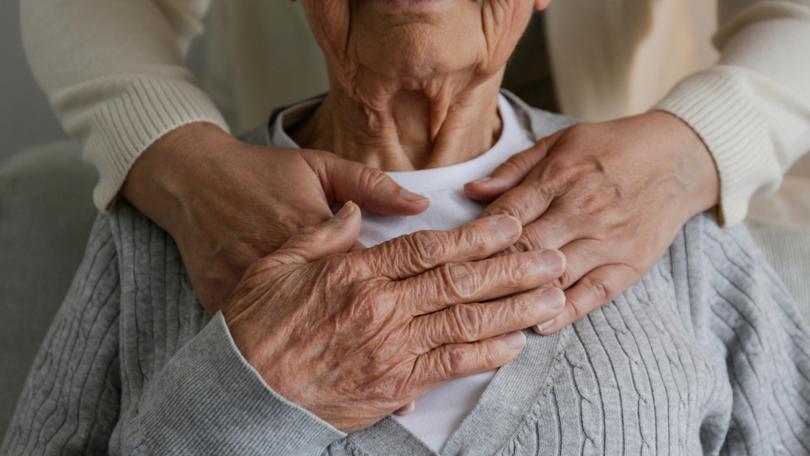The hell of being a helicopter daughter: My elderly mother needs needs attention and we hate the role reversal
We all know parents who are obsessively involved in their children’s lives. But now it’s my elderly mother who needs constant attention – and we both resent the role reversal.

They tend to gather after drop-off and I like to have an excuse ready so I can make a quick exit.
Sometimes, however, it’s unavoidable and I don’t want to appear standoffish or rude, so I’ll linger for a while for a chat — for as long as my patience will hold out.
Moneybags Moira is the one whose cheery “Yoo-hoo, time for a quick coffee?” makes me want to climb into my car and perform a handbrake turn out the exit. She just has this way of making me feel inadequate. Either glowing from a yoga class, or with a fresh blow-dry, you’ll never catch her with grey roots or rocking a Crocs and sweatpants combo.
Sign up to The Nightly's newsletters.
Get the first look at the digital newspaper, curated daily stories and breaking headlines delivered to your inbox.
By continuing you agree to our Terms and Privacy Policy.Then there’s Michelle, or Search Engine Shelly, as I like to call her. Got a problem? She’s researched it already and has all the answers. Even if you’ve done some background reading, hers will be better and will probably reveal your data as obsolete and amateurish.
Then there’s Sanctimonious Sue, who makes me feel the worst. You’ll never, ever catch her expressing relief at having dropped off her “charge” and relishing some time to herself. She actually claims to miss her when they’re apart. “I won’t know what to do with myself!”
You’re probably assuming I’m bemoaning the school run, that nerve centre of political intrigue and social sparring, navigated daily by young mothers. Well, the truth is, I put that particular torment behind me decades ago.
No, these days I’m what’s known as a “helicopter daughter”. Having moved on from my own now-grown-up children, I hover over my 88-year-old mother — overly involved, overly protective and overly competitive.
Unable to walk unaided due to a crumbling hip, spine problems and numerous other pains, Mum is reliant on her walker. As well as being profoundly deaf, she’s showing signs of dementia — forgetfulness, obsessiveness and extreme anxiety — though she’s not had a diagnosis. It means she requires near constant help — almost all provided by me.
Astonishingly, I’ve found a new community of alpha-offspring out there, all trying to work the system and get the best for their ageing parents, with the same zeal as those ‘yummy mummies’ who terrorised my 30s.
From the smug ‘granny flatters’, the super-wealthy who’ve converted an outhouse in the garden at vast expense, to those who manage to bag the best physios and the most sought-after specialists.
And even the prime Blue Badge parking spots outside the community centre, where we gather after dropping off our parents for an OAP social event — there’s a new tribe network out there.
I’m in my late 50s and took early retirement from my job in accounting last year — and since then, my widowed mother has become my job.
It’s a role to which I apply myself with the same level of diligence that saw me rise to the highest ranks of my career, with a six-figure salary and a comfortable pension.
Yet the imposter syndrome that plagued me then has followed me into this role and judges me still. Mum left without hot water because her boiler wasn’t serviced? My fault. Mum in pain because she hasn’t got the right medication? My failing. There are nights when I get home and all I can do is sob.
As I pull up outside her house, I’m already ticking off the list of things I need to do. There’s the cleaning; I like to give the place a good going over before the actual cleaner arrives. And meal prep; I’ve found an excellent fish recipe online I want Mum to try.
Salmon is high in omega-3 fatty acids, which are important for brain function and also rich in protein for muscle development. I make a note to mention it to Shelly — knowing full well she’ll reciprocate with a better one. Keeping busy is a helpful distraction from the sadness I feel watching my mother’s gradual decline towards the inevitable.
Throughout my childhood, she reigned like a duchess in a gingham pinny over this once neat and cheerful little house.
I can still picture her, dancing to Elvis with a duster in her hand, while a Victoria sponge cooled on the kitchen worktop.
Every day, when I let myself in, there is a part of me that clings to the hope I’ll find her in there, dancing still. Yet there’s another part, one I’m deeply ashamed of, that secretly hopes I’ll walk in to find she’s passed away, peacefully in her sleep.
My heart lurches with shame and pity as I find her, watching TV at full volume. Sad, resentful — yet loving — eyes meet mine.
She seems so diminished, sinking more deeply into the fading cushion covers every day. Her once strong, nimble body is failing; even her smile has given up. She loves that I’m here and yet she hates it. She needs me and she hates needing me. I run her life like a project manager, making the hour-long round trip to her home three times a week, and she resents every single one.
I don’t get much support and, although I have an older brother, as far as Mum’s care is concerned, I’m as good as being an only child. He lives abroad, turning up every few months with a suntan and a bottle of sherry to be greeted like the prodigal son.
For many years, our parents didn’t need any support. They both sailed through their 70s and were thoroughly enjoying their retirement. Dad was a factory foreman and Mum a secretary.
With a little bit of extra money for the first time, they were able to enjoy foreign holidays, trips to see West End musicals and meals out. Then, when they hit 80, it was like they reached the crest of life’s humpback bridge, only to find their brakes had failed.
Dad went first; a stroke took him quickly and mercifully with minimal loss of dignity, aged 84. Mum nursed him to the end. It was only then that I found out how much she’d relied on him; she’d never so much as paid a utility bill in her life.
The phone calls started soon afterwards. The batteries had gone in the TV remote, what should she do? The roof in the conservatory was leaking, what should she do?
I did my best to teach her, but she wasn’t interested. “Oh, your father always does that,” was her answer to every attempt to get her to help herself.
Then two years ago, she stumbled in the garden and broke her femur. My work was fantastic and allowed me as much time as I needed to oversee her rehabilitation, but, as is so often the case, Mum was never the same again.
With her mobility seriously impaired, my brother and I faced a choice: we could sell her house and plough the money into an assisted living property, or we could try to keep her in her own home for as long as possible. And when I say “we”, I mean “me”.
Mum wanted to stay at home. She’s lived here for more than 60 years, my parents having bought the house as newlyweds, and she has a lot of friends in the area.
Plus, I considered it a challenge. I’d done a terrific job with my children, striking a balance between helicoptering and gentle guidance. I could do this, I told myself. I could help Mum regain her independence and self-respect. I would be a good daughter, and I would see her smile and dance to Elvis again!
So, I became a helicopter daughter. Yet, in this new role, it’s impossible to achieve any balance; unlike raising children there are no results or rewards to be gained from stepping back from an elderly parent and letting them go it alone.
My days are exhausting and unfulfilling. There’s a sense of rearranging the deckchairs on the Titanic, and yet still I keep doing it, trying my hardest every single day — as I know Moira, Shelley and Sue are doing.
I have to admit, there is very little I enjoy about my mother’s company nowadays. I know it’s worse for her, but there’s only so many non-sequitur conversations you can have about what’s on TV tonight and who’s died.
I know, one day, there will be an early morning phone call, or I’ll turn up at the house and my poor mother will be gone, and I’ll be left feeling wretched for all my eye-rolling and the times I lost my patience with her.
When that day comes, I want to feel that I did my best. That’s all I can hope for.
Names have been changed.
